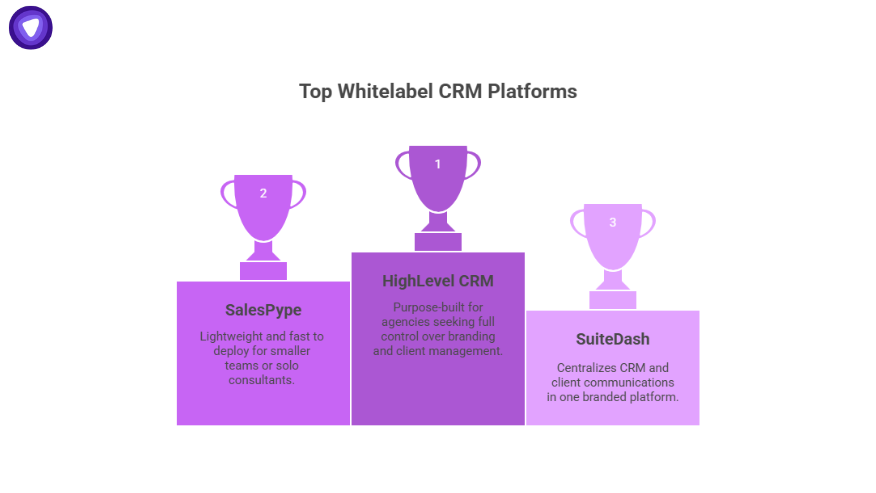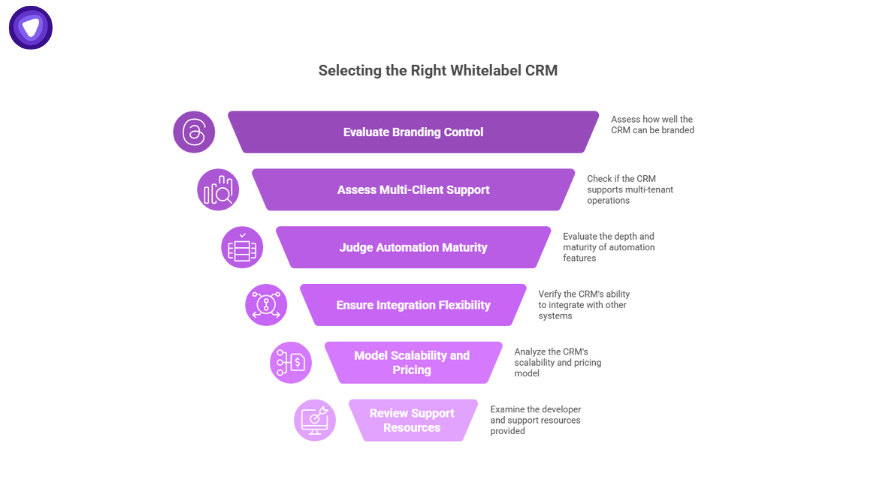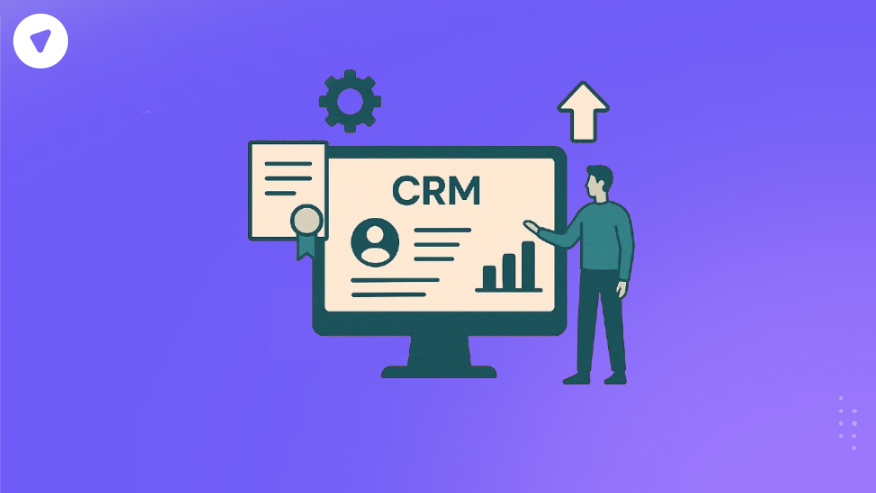Customer relationship management (CRM) systems are the backbone of any growth-focused business. They centralize client data, track interactions, and automate outreach. However, many businesses do not want to build a CRM from scratch or use platforms with heavy branding that weakens their own brand identity.
A whitelabel CRM solves this problem. It allows agencies, SaaS providers, and resellers to rebrand an existing CRM platform as their own. They can apply their own logo, domain, color scheme, and feature sets. This approach lets them launch faster, scale client accounts easily, and maintain brand consistency.
This article lists ten of the best whitelabel CRM solutions available today. It explains their strengths, ideal use cases, and what makes them suitable for different industries, including real estate, agencies, and SaaS providers.
- White-Label Ready: Whitelabel CRMs let you rebrand and resell CRM platforms under your own name.
- Who Uses Them: Ideal for agencies, SaaS providers, and real estate firms to manage clients at scale.
- Diverse Options: This list covers 15 strong CRM solutions with varied features and pricing.
- Secure Access Matters: Strong authentication and encrypted sessions are vital when reselling CRMs.
- PureVPN Support: PureVPN – White Label protects your branded platform with encrypted user sessions.
What Is White Label CRM?
A whitelabel CRM is a customer relationship management platform that another business can rebrand and resell as its own. The reseller can apply its own:
- Logo
- Custom domain
- Color scheme and UI
- Pricing and client tiers
This model is widely used by white label SMMA agencies, SaaS resellers, and consultants who want to deliver a seamless client experience while maintaining their own branding.
What’s the Difference Between a White Label CRM & an Open Source CRM?
Both white label CRM and open-source CRM systems offer flexibility, but they serve different business needs. Here’s a quick comparison:
White Label CRM Software
These are ready-made CRM platforms you can brand as your own. They are maintained and hosted by the original developers, making them an ideal choice for businesses looking for a quick-to-market solution without the need for in-house IT management. The focus is on branding and selling the product rather than on development.
Open Source CRM
Open-source CRMs offer access to the software’s source code, allowing developers to modify and customize the platform extensively. While this provides full control, it requires technical expertise and resources to maintain and update. Open-source CRM systems are better suited for businesses with a dedicated IT team or for those who want full control over the platform.
What Are the 4 Types of CRM?
| Type of CRM | Purpose | Key Features |
| Operational CRM | Automates customer-facing workflows | Contact management, lead tracking, sales pipelines |
| Analytical CRM | Analyzes customer data to guide strategy | Dashboards, segmentation, forecasting |
| Collaborative CRM | Improves data sharing between departments | Shared calendars, messaging, customer records |
| Campaign CRM | Manages marketing and sales campaigns | Email automation, ad tracking, campaign analytics |
Many whitelabel CRMs blend these types into a unified platform.
What Is a White Label CRM for Real Estate?

A whitelabel wholesale real estate CRM is designed for property firms, wholesalers, and brokers. It includes:
- Lead and property pipeline tracking
- Contract templates and e-signature tools
- Commission management
- Automated follow-up with buyers, sellers, and investors
Rebranding these tools lets real estate firms deliver a professional platform under their own domain while keeping client data secure.
Can I White Label Zoho CRM?
Yes. Zoho CRM supports limited white labeling through its partner and developer programs. Businesses can apply logos, colors, and a custom domain, but full rebranding control requires enterprise agreements. For deeper customization, other platforms in this list may be more suitable.
The 15 Best Whitelabel CRM Platforms

These fifteen whitelabel CRM platforms offer strong branding control, multi-tenant architecture, and automation features for agencies, SaaS providers, and real estate firms seeking to launch their own branded CRM systems.
1. HighLevel CRM
Best for: Marketing agencies and SMMA firms
- Complete rebranding, including white label mobile app
- Sales pipeline tracking, email and SMS automation, scheduling
- Unlimited sub-accounts for clients
- Built-in billing modules for resellers
Why it stands out: Purpose-built for agencies seeking full control over branding, pricing, and client management.
2. SalesPype
Best for: Small agencies and consultants
- Full customization with your domain and branding
- Built-in SMS, email automation, and affiliate tools
- Positive reputation from recent SalesPype reviews
- Reporting dashboards for client transparency
Why it stands out: Lightweight and fast to deploy for smaller teams or solo consultants.
3. SuiteDash
Best for: Agencies needing a white label client portal
- Combines CRM, billing, and project management
- Secure white label client portal for file sharing
- Internal chat, forms, and scheduling
- Permission controls for multiple client accounts
Why it stands out: Centralizes CRM and client communications in one branded platform.
4. GoHighLevel SaaS Mode
Best for: Agencies launching white label SaaS products
- Offers CRM as a white label SaaS
- Subscription billing, onboarding, and support modules
- Drag-and-drop automation workflows
- SMS, voice, and email campaign tools
Why it stands out: Converts an agency model into a scalable SaaS business.
5. Vendasta CRM
Best for: Digital agencies and resellers
- Multi-product white label marketplace with CRM tools
- White labeled dashboards and client reporting
- Partner-ready structure for scaling
- Built-in fulfillment and lead tracking
Why it stands out: Lets agencies combine CRM with other marketing and local services.
6. Bitrix24
Best for: Enterprises and multi-department firms
- CRM, contact center, and project tools
- White label domains and themes
- Cloud or on-premises hosting
- HR and internal communication modules
Why it stands out: An enterprise-grade system with flexible hosting.
7. Vtiger CRM
Best for: SMBs seeking modular open source CRM
- Modular architecture and code-level access
- Full branding and API control
- Sales, marketing, and support modules
- On-premises deployment options
Why it stands out: Combines cost-efficiency with full customization.
8. Odoo CRM
Best for: SaaS resellers and developers
- Open source framework with 1000+ modules
- Custom branding and domain support
- Full access to source code for deep customization
- Includes billing, inventory, and project apps
Why it stands out: Extreme flexibility for SaaS-oriented CRM resellers.
9. Agile CRM
Best for: Agencies managing small portfolios
- Branding customization and template control
- Contact, deal, and marketing automation features
- Integrated scheduling and helpdesk modules
- Affordable for small teams
Why it stands out: Easy entry point for small-scale white labeling.
10. SuiteCRM
Best for: Enterprises needing full control
- Fully open source CRM with complete code access
- Custom themes, modules, and branding
- Complex workflow automation
- Active developer community
Why it stands out: Gives full ownership of the CRM stack.
11. GoCRM
Best for: Sales-focused teams
- Combines CRM with outbound calling and SMS tools
- Custom branding and reporting portals
- Pipeline dashboards and campaign tracking
- Integrated VoIP capabilities
Why it stands out: Strong communication focus for sales-driven agencies.
12. Nimble CRM
Best for: Small marketing firms
- Simple UI and fast deployment
- Social media integration and contact enrichment
- Custom branding for client portals
- Email and calendar sync
Why it stands out: Easy onboarding and social prospecting tools.
13. Freshsales CRM
Best for: Growing SaaS agencies
- AI-powered lead scoring and pipeline insights
- Custom branding options
- Multi-client structures with role permissions
- Robust analytics and forecasting
Why it stands out: Enterprise features with mid-market pricing.
14. Keap Pro
Best for: Automation-heavy agencies
- Drag-and-drop automation workflows
- Branded client portals and reports
- Built-in invoicing and payments
- Strong email marketing engine
Why it stands out: Combines CRM and marketing automation under one roof.
15. Pipedrive CRM
Best for: Deal-centric sales teams
- Visual pipeline UI and deal forecasting
- API access for branding and extensions
- Modular add-ons and workflow builder
- Mobile CRM app available
Why it stands out: Fast and intuitive for high-volume deal tracking.
Secure Your Whitelabel CRM with PureVPN
Running a whitelabel CRM means handling large volumes of sensitive client data. Any data leak or session hijack can damage your brand reputation.
PureVPN’s white label solution lets you embed your own branded VPN layer directly into your CRM platform. It provides:
- Encrypted tunnels for client logins
- Device posture checks before access
- Multi-factor authentication
- Session logging for compliance audits
Adding this secure access layer shows your clients that their data is safe on your platform. It also differentiates your brand from generic CRM resellers who lack security guarantees.
How to Choose the Right Whitelabel CRM?

Selecting the right whitelabel CRM requires balancing branding control, scalability, automation depth, and support resources to match your business model.
1) Branding control
Evaluate how fully the platform disappears behind your brand.
- Domain and UI: Custom domain, logo, colors, favicon, email “from” name, login screen.
- White label client portal: Your logo only, no “powered by” badges, branded PDFs and reports, custom email templates.
- Mobile and system assets: Branded mobile app availability, push notification sender name, custom terms and support links.
- Risk checks: Hidden vendor URLs, footer credits, upsell banners, or emails that reveal the vendor.
2) Multi-client support
Confirm it supports true multi-tenant operations for agencies and SaaS.
- Tenants and roles: Separate sub-accounts, data isolation, fine-grained roles for admins, managers, contractors.
- Templates and cloning: Copy pipelines, automations, dashboards into new client spaces in minutes.
- Billing and limits: Per-tenant usage limits, per-client invoicing, audit logs per tenant.
3) Automation and reporting
Judge the maturity of workflow and analytics, not just “has automation.”
- Workflows: Triggers on form submits, deal stage changes, inbound calls or SMS, webhooks. Branching logic, retries, time windows.
- Channels: Email, SMS, voice, tasks, webhooks to external tools. Throttling and quiet hours for compliance.
- Analytics: Pipeline health, cohort conversion, attribution, scheduled exports, dashboard sharing.
4) Integration flexibility
Your stack will change. The CRM must connect cleanly.
- APIs and webhooks: Documented REST API, stable versioning, useful webhooks for contacts, deals, activities.
- Identity and data: SAML or OIDC SSO, SCIM user provisioning, custom objects and fields, bulk import and export.
- iPaaS and natives: Zapier or Make, plus native email, calendar, telephony, accounting, and ad integrations.
5) Scalability and pricing model
Model total cost at 10x your current size.
- Pricing units: Per user, per account, or per tenant. Storage and message quotas. Telephony pass-through fees.
- Performance: API rate limits, job queues, large list sends, long pipelines.
- Growth safety: Contract terms for upgrades and exits, data export guarantees, backup policy, regional hosting options.
6) Developer and support resources
Strong developer care reduces rollout time and risk.
- Docs and tooling: Clear API docs, SDKs, sandbox environments, changelogs, status page, uptime SLA.
- Security and compliance: SOC 2 reports, GDPR features, audit trails, IP allowlists, encryption in transit and at rest.
- People and community: Partner manager access, solution engineers, active community forum, realistic response times.
7) Selection and proof process
Run a short, structured evaluation to avoid surprises.
- Shortlist: 3–4 vendors that match your brand, tenant, and automation needs.
- Scorecard: Weight branding 20%, multi-tenant 20%, automation 20%, integrations 15%, scale and price 15%, support 10%.
- Proof of concept: Recreate one live pipeline, one automation, one report, one tenant template, a complete data import, and a branded portal in one week.
Migration plan: Field mapping, duplicate rules, consent and unsubscribe carryover, historical email and task import.
Conclusion
Whitelabel CRM platforms allow businesses to offer complete client management solutions without building software from scratch. They support brand consistency, shorten go-to-market timelines, and reduce operational overhead.
HighLevel CRM, SalesPype, and SuiteDash are ideal for agencies. Bitrix24 and Freshsales work well for large organizations. SuiteCRM and Odoo provide full open source flexibility. Adding PureVPN – White Label strengthens security and builds client trust.
Selecting the right combination of features, scalability, and security creates a CRM platform that grows with your brand.


